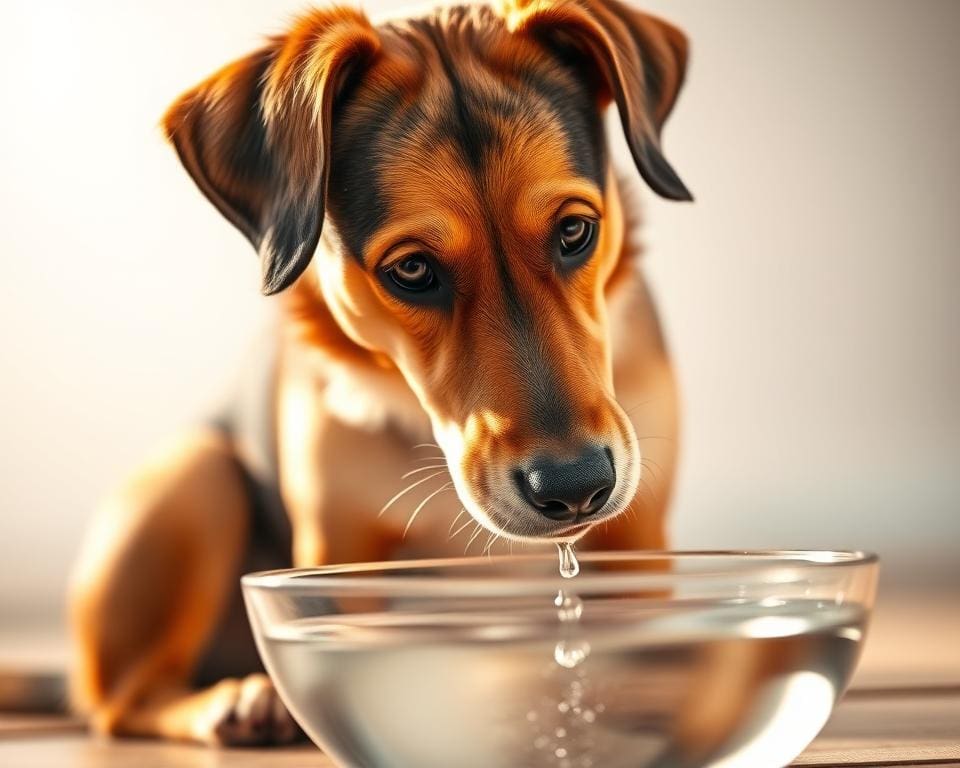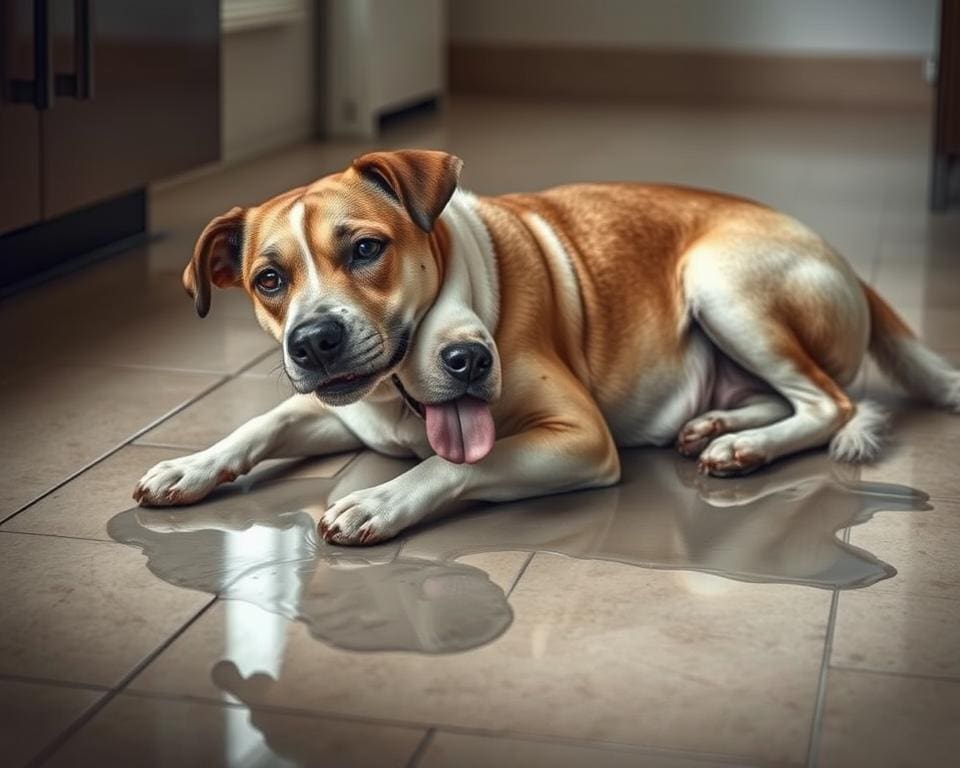As pet owners, it’s our duty to ensure the health and well-being of our furry friends. Hydration is vital for dogs, but it’s essential to understand the potential dangers associated with excessive hydration in dogs. This article will explore what happens if a dog drinks too much water, delving into the serious implications of water intoxication in canines. The concept of water intoxication may often be misunderstood, and recognising the signs and risks involved is crucial for responsible pet ownership. By shedding light on this important topic, we aim to empower dog owners with knowledge, so they can provide the best care possible.
The Importance of Hydration for Dogs
Understanding the importance of hydration for dogs goes beyond just filling a bowl with water. Proper hydration plays a crucial role in various aspects of a dog’s health, making it essential for pet owners to grasp their pet’s hydration needs. Water helps to regulate body temperature, aids digestion, and lubricates joints, contributing significantly to overall well-being.
Understanding Canine Hydration Needs
Several factors influence canine hydration needs. Each dog has unique requirements based on size, breed, activity level, and climate. Larger breeds may need more water than smaller ones, while active dogs require additional hydration compared to sedentary ones. Hot weather can also increase their need for fluids. It’s vital for owners to observe their pets and adjust their water intake accordingly to ensure optimal health.
How Much Water Should Dogs Drink?
Dog owners often wonder how much water should dogs drink daily to stay adequately hydrated. A general guideline suggests that dogs drink approximately 30-50 millilitres of water per kilogram of body weight each day. For example, a 10-kilogram dog would need between 300 to 500 millilitres of water daily. Offering fresh water regularly and monitoring your pet’s intake is key to ensuring they meet their hydration needs.

What Happens If A Dog Drinks Too Much Water
Understanding the concept of water intoxication in canines is vital for every dog owner. This serious condition occurs when a dog consumes an excessive quantity of water in a short amount of time. Such rapid intake can lead to a dangerous dilution of essential electrolytes in the bloodstream, particularly sodium. This imbalance may result in several severe health issues.
Defining Water Intoxication in Canines
Water intoxication in canines presents a significant health risk due to its effects on the body’s fluid balance. When dogs drink more water than their kidneys can process, their blood becomes diluted, leading to hyponatraemia—an abnormally low level of sodium. This condition can overwhelm a dog’s organs and lead to symptoms that range from mild to life-threatening.
Explaining the Risks of Excessive Water Intake
Recognising the risks of excessive water intake in dogs is crucial for prevention. Some potential dangers include:
- Neurological symptoms such as disorientation, seizures, or coma
- Swelling of the brain, leading to intracranial pressure
- Cardiovascular strain, which may cause heart issues
- Potentially fatal outcomes without prompt treatment
Understanding these risks empowers dog owners to monitor their pets’ drinking habits carefully and maintain a safe hydration balance.
Symptoms of Overhydration in Dogs
Identifying the symptoms of overhydration in dogs is crucial for safeguarding their health. Dogs that consume excessive amounts of water can experience severe consequences. Understanding the common signs of water toxicity can empower pet owners to take swift action.
Recognising Signs of Water Toxicity
Water toxicity manifests through several noticeable symptoms. Owners should be vigilant for the following signs:
- Increased urination
- Lethargy and tiredness
- Bloating
- Vomiting
- Disorientation and confusion
Detecting these symptoms of overhydration in dogs early can prevent the escalation of serious health issues that might arise from prolonged exposure to excess water intake.
Behavioural Changes to Watch For
In addition to physical symptoms, behavioural changes may indicate water toxicity. Signs include:
- Anxiety
- Restlessness
- Seizures
Being alert to these changes is essential for dog owners. Quick recognition of the signs of water toxicity can lead to timely intervention, ensuring the wellbeing of your furry friend.
Understanding Water Toxicity Mechanism
Excessive hydration poses significant risks to a dog’s health, underscoring the importance of understanding water toxicity and its mechanisms. When a canine consumes an overabundance of water, it disrupts the delicate balance of electrolytes essential for proper physiological function.
How Excessive Hydration Affects Canine Physiology
One of the principal issues triggered by excessive hydration is the dilution of sodium levels in the bloodstream. Sodium plays a crucial role in cellular function and fluid regulation. When sodium concentrations drop, it can result in a condition known as hyponatraemia, leading to cellular swelling.
The swelling of cells, particularly in the brain, presents a severe health threat. The cranium provides limited space for swelling, and as brain cells expand, this can lead to increased intracranial pressure. Symptoms may include confusion, lethargy, and even seizures, showcasing the profound effects of excessive hydration on canines.
In addition, the kidneys may struggle to excrete the surplus water efficiently, further complicating the situation. A healthy dog can balance its water intake, but when overwhelmed, the risk of long-term physiological effects escalates. Understanding water toxicity is vital for dog owners to prevent conditions that could jeopardise their pet’s wellbeing.
Treatment for Water Poisoning in Dogs
Addressing water poisoning swiftly can be crucial for a dog’s health. Recognizing the signs and knowing the appropriate treatment for water poisoning in dogs can make a significant difference. Below are immediate actions to take for water intoxication, followed by possible veterinary interventions.
Immediate Actions to Take
If you suspect your dog has consumed excessive water, it is essential to act quickly. Start by:
- Removing access to fresh water to prevent further intake.
- Monitoring your dog closely for any symptoms of distress, such as nausea, lethargy, or confusion.
- Contacting your veterinarian or an emergency animal clinic for advice.
Veterinary Interventions and Care
Once at the veterinary clinic, professionals may employ several treatments tailored to manage water poisoning. Common interventions include:
- Administering intravenous fluids to help restore electrolyte balance.
- Utilising diuretics to encourage urination and eliminate excess water from the body.
- Carefully monitoring the neurological status of the dog to ensure no lasting damage occurs.
Preventing Water Toxicity in Pets
Maintaining a healthy drinking routine for dogs is essential for their well-being. Dog owners play a crucial role in ensuring that their pets stay hydrated without risking overhydration. By adopting proactive measures, you can significantly reduce the risk of water toxicity in pets.
Establishing a Healthy Drinking Routine
Creating a structured drinking routine tailored to your dog’s individual needs helps prevent overhydration. Provide fresh water at regular intervals throughout the day, ensuring that your pet has constant access to clean drinking water. This practice not only guarantees hydration but also supports a balanced drinking schedule. Be mindful of your dog’s activity levels and adjust their water availability accordingly, especially during playtime or hot weather.
Monitoring Water Intake in Active Dogs
For active dogs, monitoring water intake becomes even more vital. During exercise or warm days, the amount of water consumed can increase dramatically. Encourage your dog to take breaks and drink water at designated times, preventing them from gulping down large quantities in one go. Keep an eye on signs that may indicate excessive drinking and adjust their water access as needed. Implementing these strategies contributes to preventing water toxicity in pets while promoting a healthier lifestyle.
Canine Overdrinking Effects
Excessive hydration in dogs can lead to serious long-term health issues. Awareness of the canine overdrinking effects is essential for responsible pet ownership. Over time, dogs that consume too much water may experience various complications that affect their overall well-being. Keeping an eye on hydration patterns is critical in preventing these serious conditions.
Long-Term Impacts of Excessive Hydration
Excessive hydration can result in chronic kidney problems, significantly impacting a dog’s quality of life. In extreme cases, this could lead to kidney failure, necessitating a series of expensive and invasive treatments. Bladder issues are another common consequence associated with excessive water intake; persistent overhydration may cause urinary tract infections and increased frequency of urination.
Beyond physical health, excessive hydration can lead to behavioural changes. Dogs may develop anxiety or compulsive drinking habits, which not only affect their behaviour but carry implications for their mental well-being. It is crucial for pet owners to monitor their dog’s water consumption and be mindful of any unusual behaviours that may indicate a deeper problem.
Regular veterinary check-ups can play a vital role in ensuring a dog’s long-term health. These appointments provide opportunities for early detection of any potential issues related to hydration habits. By staying vigilant and informed, pet owners can provide a balanced approach to their dog’s hydration needs that safeguards against the long-term impacts of excessive hydration.
Additional Considerations for Dog Owners
Understanding the hydration needs of your dog goes beyond simply providing a bowl of water. There are various considerations for dog owners regarding hydration that can greatly enhance your pet’s health. Different breeds have unique requirements, and small dogs may have different hydration needs compared to larger breeds. Researching your specific dog’s breed can help in establishing an effective hydration routine that caters to their physical characteristics.
Environmental factors also play a crucial role in a dog’s water intake. For instance, warm weather, physical activity, and even dietary choices can influence how much water your pet needs. In hot climates or during vigorous exercise, dogs may require additional hydration to compensate for fluid loss. Therefore, being aware of these variables is one of the essential considerations for dog owners regarding hydration.
Moreover, it’s important to stay vigilant for signs of distress in your dog. Symptoms such as excessive panting, lethargy, or unusual behaviour can indicate dehydration or water intoxication. Empowering yourself with knowledge about these signs, along with keeping local veterinary contacts on hand for urgent situations, can make all the difference in ensuring your dog’s wellbeing. With attention and care, you can support your pet’s hydration health effectively.









